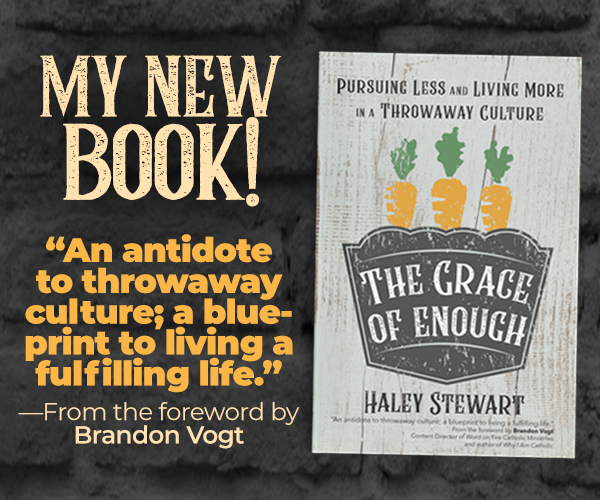This is a guest post by my dear friend Tyler Blanski about what one of my favorite literary heroes can teach us. – Haley

The world needs more Gilberts. The fictional (and admirable!) character Gilbert Blythe of the L.M. Montgomery’s Anne of Green Gables series seems to capture so many virtues that can help men succeed in their vocation to fatherhood today: he gives a standing ovation for his girl, he listens, he’s loyal, he’s strong and gentle all at once, he’s studious and ambitious, he’s open to life, he has conviction, and he has a vision for his life: “I have a dream,” he says in Anne of the Island. “I persist in dreaming it, although it has often seemed to me that it could never come true. I dream of a home with a hearth-fire in it, a cat and dog, the footsteps of friends – and you!”
Perhaps most of all, Gilbert reminds us that wanting and working for a home is not “settling.” Not at all. Family life, rightly considered, is anything but dull, and the grand adventure of life lies within the home. G.K. Chesterton put it this way: “Of all modern notions, the worst is this: that domesticity is dull.” He didn’t mince his words:
Inside the home, they say, is dead decorum and routine; outside is adventure and variety. But the truth is that the home is the only place of liberty, the only spot on earth where a man can alter arrangements suddenly, make an experiment or indulge in a whim. The home is not the one tame place in a world of adventure; it is the one wild place in a world of rules and set tasks.
Still, a lot of men don’t see building a home as the great adventure of their life, so, Gilberts aside, I’m just going to go straight to the top here:
Jesus is a homemaker.
He said, “My Father’s house has many rooms,” and “I am going to prepare a place for you” (John 14:2). And when everything’s ready at this house with many rooms, he’s coming back to bring us there. “If I go to prepare a place for you, I will come back and take you to be with me” (John 14:3). I just have to let that sink in for a minute.
Right now, this very moment, Jesus is working on a home. After dying on the cross and rising again, our Lord left to prepare for us a place, to build a house.
If a man wants to build a home, it’s time someone told him straight: this is exactly what he should want. It’s difficult to think of a more noble ambition than to provide for a family, to become a stronger husband and father, or to grow personally and professionally in order to “prepare a place,” an earthly foreshadowing of heaven. When men reach their full potential, the world has more happy marriages, kids have their moms and their dads, businesses have more virtuous leaders, parishes become closer-knit and more evangelical, and the men themselves have the health and virtue necessary to reach their full potential. Everyone wins. And that’s why it’s so important to find the Gilberts in this world and to help them succeed in their vocation to fatherhood.
Bring it home
A trove of data, not to mention a library of field-notes from the pages of history, all adds up to an obvious conclusion: it’s difficult for a human being—any human being—to thrive without a home. Even a brief survey of human history illustrates that the responsibility of a home is good not only for women and children, but is good for men themselves.
It sounds almost backwards to say it today, but a Gilbert with a family is in some sense smarter, stronger, richer, and happier than his bachelor counterpart. He has a home, a family, local responsibilities, and hopefully the ability to enjoy it all with arms wide open. He is neither nomadic nor sporadic. As he grows old, if he is humble enough to be a life-long learner, he grows in virtue. Ideally, he has real beliefs, gives generously, and is grateful for all that God has given him. Out of his conviction, he leads. And when he dies, he leaves behind a legacy.
Nothing is wrong with being a single, childless man with no familial responsibilities. Such a man can have invaluable impact, to be sure, in his profession, in politics, in parish involvement, in his extended family relationships. But a bachelor’s responsibility for a local community is, quite understandably, more abstract and less committed than it is, quite naturally, for a father who is accountable to a wife, must provide for more people than himself, and whose very own children will inherit the community’s successes and failures. If any bachelor disagrees with me, he’s welcome to come over and change my children’s diapers and feel the weight—the smell—of this kind of responsibility. And it never ends. There’s no quiet morning alone to get your head right or an evening where you can skip their bedtime routine. Once you’re a dad, there’s no going back.
Why family? Why virtue? Why cultivating a home? Because these things, like the home itself, aren’t just good for everyone else involved—they’re good for the man himself.
In a culture that places such a strong emphasis on careers, it’s only too easy to forget why we are working in the first place. Success and failure, joy and suffering, love and hate, peace and war—it all starts in the home. Home isn’t just where the heart it is; it is the heart. The home is the foundation of all we do in this life; second only to the Eucharist, it is the source and the summit.
If anyone is looking to make a decisive change for the better, it seems to me the most effective place to start—and end!—is home. “If there is happiness on earth,” Rousseau once said, “it must be sought in the abode where we live.” Or as the Bible puts it, “Whoever works his land will have plenty of bread, but he who follows worthless pursuits will have plenty of poverty” (Proverbs 28:19).
Project Gilbert
Men were made for more than just throwing hatchets and grunting and the occasional bath. We were made to be intelligent and emotionally competent men of virtue who can ignite (and sustain) real and lasting change in the world, starting not only in the workplace but at home.
The problem is, “doing” home, and doing it well, is one of the most difficult skills a man can hope to master. This is why men often try to bring about change everywhere except at home—as if more money or a better job can solve all our problems. This is backwards. Bigger paychecks and more fulfilling careers can help, but if you want real and lasting change in your life, you have to put first things first. And home is the first thing.
In Anne of Avonlea, Gilbert makes up his mind to be “worthy of Anne’s friendship and perhaps some distant day her love.” From his consistent courtship of Anne (a patient friendship that looks beyond mere dating to marriage) to his aspiring to be a doctor and going to Redmond College (not only to “find himself” but presumably to become “marriage material”), Gilbert reminds us that the home is a worthy pursuit. A worker is someone who earns money for any number of reasons. A breadwinner is a person who earns money to support a family. A father, however, is not only a breadwinner but also in some sense a homemaker. In a small imitation of Christ, he gets to “prepare a place,” a tiny foretaste of heaven on earth. Even if he must leave his home to fight great battles, it’s for the sake of his home that he fights. “The true soldier fights not because he hates what is in front of him,” says G.K. Chesterton, “but because he loves what is behind him.”
Someone, I think it was Homer, once said that “There is nothing more admirable than when two people who see eye to eye keep house as man and wife, confounding their enemies and delighting their friends.” Home is the first thing. And that’s why today our world needs something like a “Project Gilbert,” a way to encourage men to succeed in their vocation to fatherhood.
Our culture doesn’t usually praise strong fathers or tranquil homes. From Homer Simpson to the Terminator, it tends rather to idealize a man who is either so weak no woman could respect him or so brutal no woman could endure him. Our culture tends to idealize broken homes and mock healthy homes. But that’s exactly what all of us should want in a man—a protector and provider of a healthy and happy home. It’s worth fighting for—a household full of mirth and song and good food, crowded with guests and ovations and the shouts of children, with enough tears and grieving and difficult high-stakes conversations to fill a lifetime.
As my wife can tell you, I’m no expert. I’ve had more than my share of “Carrots!” moments. I’ve made a lot of mistakes, and I’m learning so much every day. But as challenging as fatherhood can be, I don’t ever want to tap out. I want to find the Gilberts of the world and not only support them but learn from them as well.
Gilbert is one of many men who embody what I call the “fight for milk,” the focused effort to prepare “a place” in this world. Gilbert is pleasantly persistent in courting Anne. He has a vision for what the future could be like with her, and he works hard to get there, studying and working and eventually becoming a highly respected doctor. He appreciates Anne because she’s different from everyone else. He is her best friend, her academic rival, her counterpart. He cares deeply about his family and friends. Headstrong but devoted, he challenges Anne and makes her laugh. He is open to life (he and Anne have six children!). He has a deep conviction in the face of adversity.
The world needs more Gilberts. This husband, father, and breadwinner reminds us of what it can look like to fight for milk—and win.

Learn more about the Project Gilbert at www.fightformilk.com/projectgilbert
Tyler Blanski is a Catholic father, the author of An Immovable Feast, and the founder of the Fight for Milk apostolate. He lives in Minnesota with his wife and three children. Learn more at www.fightformilk.com/projectgilbert

Tyler, this is so very good. And I’m so grateful to be married to a Gilbert.
And what a great Chesterton quote! Hadn’t heard that one yet.
I loved the Chesterton quote! I haven’t heard that one. It’s great to be reminded that there are still Gilberts in the world 🙂
Absolutely love this! Gilbert was one of my favorite literary characters growing up, and the world definitely needs more of him.
Yes! I love this. Before I met my husband, my girlfriends and I would often say “I gotta get me a Gilbert Blythe”. I’m happy to say I did marry a Gilbert. Your words capture what my younger self seemed to intuitively perceive in Gilbert’s character.